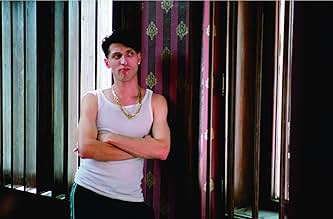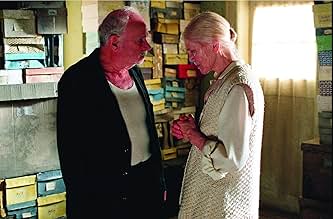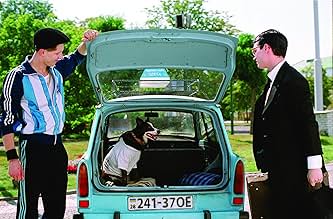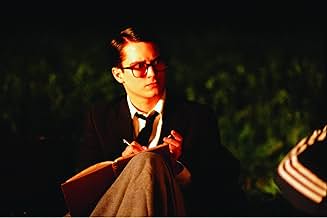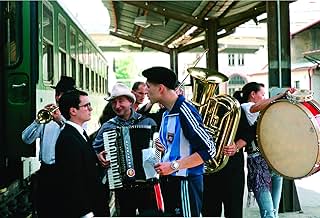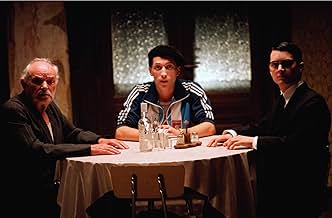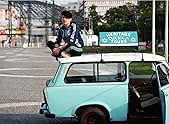Un giovane ebreo americano cerca di trovare la donna che ha salvato suo nonno durante la seconda guerra mondiale in un villaggio ucraino, che alla fine è stato raso al suolo dai nazisti, con... Leggi tuttoUn giovane ebreo americano cerca di trovare la donna che ha salvato suo nonno durante la seconda guerra mondiale in un villaggio ucraino, che alla fine è stato raso al suolo dai nazisti, con l'aiuto di un eccentrico locale.Un giovane ebreo americano cerca di trovare la donna che ha salvato suo nonno durante la seconda guerra mondiale in un villaggio ucraino, che alla fine è stato raso al suolo dai nazisti, con l'aiuto di un eccentrico locale.
- Regia
- Sceneggiatura
- Star
- Premi
- 7 vittorie e 6 candidature totali
- Grandfather
- (as Boris Leskin)
- Ukrainian Band Member
- (as Sergej Rjabcev)
- Ukrainian Band Member
- (as Jurij Lemeshev)
Recensioni in evidenza
The tone of the film, however, shifts when Jonathan and Alex do finally meet the woman they're looking for, and suddenly, this adorable comedy turns into a heart-breaking historical drama about a Jewish village that was annihilated during the Nazi occupation. Everything Is Illuminated is about history, heritage, and the wisdom that can be gained from uncovering the past. It's perfect.
I would have given the movie a higher rank, but I feel that the translation from Russian/Ukrainian into English is not done too well. At times, that is clearly deliberate. At times, I could not find a better way to re-tell the situation as it has a slight Lost in Translation effect. At times, it was just poorly done. Thankfully, there are very few poorly done moments. At one point, the English translation is a direct opposite of what the actors actually said.
However, I feel that a significant amount of the humor comes from a deliberate mis-translation from Russian to English. While some viewers may feel that they are left out, there are situations which are difficult to convey in a few phrases that have yeas of history and culture behind them. You definitely get the most out of this movie if you understand Russian. You get even more if you understand the cultural differences between primarily Russian-speaking Odessa and primarily Ukrainian-speaking L'viv. Some anecdotes are simply incorrect, albeit funny.
Regardless of the 8, I still add this movie to my favorites. I feel that much of what is incorrect is left as-is for a reason, and overall, the movie does very well to convey life in Ukraine (the old and the new), the friendliness, though maybe rough up-front, of the people and the story itself. Well done.
Debut director/adapter Liev Schreiber retains some of the humor and language clashes of the novel, mostly through the marvelous Eugene Hutz as the U.S.-beguiled Ukrainian tour guide. He is so eye-catching that the film becomes more his odyssey into his country and his family as he goes from his comfortable milieu in sophisticated Odessa to the heart of a cynical, isolated land that has been ravaged by conquerors through the Communists and now capitalists, with both Jews and non-Jews as detritus. As funny as his opening scenes are when he establishes his cheeky bravura, we later feel his fish-out-of-waterness in his own country when he tries to ask directions of local yokels.
Shreiber uses Elijah Wood, as the American tourist, as an up tight cog in a visual panoply, as his character is less verbal than as one of the narrators in the book. He and Hutz play off each other well until the conclusion that becomes more sentimental in this streamlined plot. Once the grandfather's story takes over in the last quarter of the film, marvelously and unpredictably enacted by Boris Leskin, the younger generation does not seem to undergo any catharsis, as they just tidy up the closure.
Schreiber does a wonderful job visualizing the human urge to document history. One of his consultants in the credits is Professor Yaffa Eliach and her style of remembering pre-Holocaust shtetl life through artifacts clearly inspired the look and it is very powerful and effective.
The Czech Republic stands in for the Ukraine and the production design staff were able to find memorable symbols of change in the cities, towns and countryside, as this is now primarily a road movie, and the long driving scenes do drag a bit. Schreiber retains some of the symbolism from the book, particularly of the moon and river, but having cut out the portions of the book that explain those, they just look pretty or ominous for atmosphere and no longer represent time and fate.
As W.C. Fields would have predicted, the dog steals most of his scenes for easy laughs. In general, Schreiber does go for more poignancy than the book. It is irresistibly touching, especially for those who haven't read the book, but less morally and emotionally messy.
The film is enormously uplifted by its marvelous soundtrack, which ranges from songs and instrumentals from Hutz's gypsy band to traditional tunes to contemporary tracks to Paul Cantelon's klezmer fusion score.
This is not a Holocaust film per se, being a kind of mirror image of "The Train of Life (Train de vie)" as about memory of a time that is freighted with meaning now, but will resonate more with those who have an emotional connection to that history.
Based on the novel by Jonathan Safran Foer, Everything Is Illuminated is the directorial debut of actor Liev Schreiber. Schreiber also wrote the screenplay. In the movie, Jonathan (Elijah Wood) obsessively collects items from his family, from toothbrushes to retainers to scraps of paper which he then seals in ziploc bags and pins to a wall in his house to record his family history. But the space for his grandfather is conspicuously bare. All Jonathan really has of him is a piece of jewelry and an old photo of him with a woman who hid him from the Nazis during the Second World War. Jonathan decides to undertake a quest to Ukraine to find the woman, thank her, and learn more about his grandfather.
His quest is aided there by a couple of characters who run a tourist company for Jewish people, including a young man obsessed with western culture (Eugene Hutz), his grandfather (Boris Leskin), who thinks he is blind and who may have memories and demons of his own from the war, and his grandfather's temperamental seeing eye dog.
The screenplay effectively combines both humour and drama as the three characters travel through the countryside looking for Jonathan's grandfather's town, driving deeper and deeper into the memories of the past. The best performance probably comes from Eugene Hutz, playing Alex Jr., who starts the movie as a tracksuit-wearing, break dancing slacker just out to have fun but evolves into something more as not only Jonathan, but all the characters gain their own illumination.
Liev Schreiber, Elijah Wood, and Eugene Hutz attended the screening and did a very humorous Q&A after the film:
- Schreiber was very close to his grandfather, who was a Ukranian immigrant, and who died in 1993. This caused him to start to write to get his memories down on paper. Meanwhile, he was asked to do a reading of Foer's short story, The Very Rigid Search, which was an excerpt from the still unpublished novel. Schreiber was blown away by the quality of the writing, saying that Foer had done in 15 pages what Schreiber tried to do in 107. Schreiber approached Foer and they talked about their grandfathers, culture, movies, and the nature of short-term memory in America; in the end, Foer agreed to let Schreiber adapt the book.
- Schreiber's own project was intended to be a road movie, but the book has parallel narrative that is an imagined chronological history of the town of Trochenbrod that spans 500 years; given his budget and limitations as a filmmaker, he said he'd leave that to Milos Forman and take the road trip instead. This imagined chronology was what moved him to make the movie in the first place, the idea that "a past lovingly imagined was as valuable as a past accurately recalled".
- Schreiber said the movie was a series of happy accidents. After searching unsuccessfully in Ukraine for an actor, he was walking through the Lower East Side in New York, when he saw a poster of a woman centaur, topless from the waist up, with an insane cossack sitting astride her. Under the poster said the name Gogol Bordello Ukranian Punk Gypsy Band.
Eugene Hutz then took over the story. He had never pursued acting as music was his first passion. One day, a friend gave him the book, and he thought it was written in a manner similar to how he writes music; screw sentences/syntax, language is my own.
Later, they got a call from a production company, looking for eastern European music that was medieval but modern. Hutz met with Schreiber, and he soon found the movie was based on the book he just happened to be reading. Not long after that came up, Schreiber asked Hutz what he thought about Alex and whether he could do the character by any chance.
- Foer and Schreiber talked about the film in the fall of 2001, shortly after the events of September 11. Both were in Europe at the time and they talked about the derogatory comments they were hearing about Americans, which led Schreiber to want to try to find an articulate American who would defy the stereotype that Europeans have of Americans. Someone who was awkward, vulnerable, flawed, innocent, and looking for history beyond the borders of his own country. Schreiber started thinking about who that was, and Elijah came up.
One of Schreiber's inspirations as a filmmaker is Emir Kusturica (I think that's who he said, who also directed a segment in another festival movie, All the Invisible Children) who said "you don't look for the actors, you look for the people." Schreiber said there is something about who Elijah is that he has a generosity of spirit and a sincere goodness as a human being, that came across on film. Schreiber said that the eyes are important when trying to articulate a character who is an observer, and that if "eyes are the doors to the soul, Elijah's are garage doors."
- Elijah Wood had fun with a question about the similarities between his character Kevin in Sin City and Jonathan in this movie as both are sort of a blank slate on which emotions are projected. Wood replied that Jonathan may seem still and seemingly emotionless, but it is all about his observations, about his experiences with other characters and the environment he was in.
- On the differences between directing and writing: Schreiber said he likes writing a lot more and jokingly described directing as "hell". After his grandfather died, Schreiber started to think about how to preserve some sense of history and himself; is he content driven or not, or just good at interpreting other people's work? He said he loved the exercise of figuring out what is emotional to you, important to you.
Lo sapevi?
- QuizEugene Hutz's band Gogol Bordello appears as the polka band that greets Elijah Wood at the train station.
- BlooperWhen the Grandfather repeatedly sounds the horn of the car, he presses the middle of the steering wheel to do so. In the Trabant, the horn is activated by pushing the signal light lever forward.
- Citazioni
Alex: I have reflected many times upon our rigid search. It has shown me that everything is illuminated in the light of the past. It is always along the side of us, on the inside, looking out. Like you say, inside out. Jonathan, in this way, I will always be along the side of your life. And you will always be along the side of mine.
- Curiosità sui creditiSeveral songs are credited to the New York punk/Gypsy/Jewish klezmer band, Gogol Bordello, which is led by Eugene Hutz, who plays Alex in the film (the same band greets Jonathan when he arrives on the train). The last of these songs, "Start Wearing Purple (For Me Now)," which plays over the end credits, is credited to both a correct spelling (Gogol Bordello), dg and Gogol Bodello, an incorrect spelling.
- ConnessioniFeatured in Today: Episodio datato 24 novembre 2005 (2005)
I più visti
Dettagli
- Data di uscita
- Paese di origine
- Sito ufficiale
- Lingue
- Celebre anche come
- Everything Is Illuminated
- Luoghi delle riprese
- Aziende produttrici
- Vedi altri crediti dell’azienda su IMDbPro
Botteghino
- Budget
- 7.000.000 USD (previsto)
- Lordo Stati Uniti e Canada
- 1.712.337 USD
- Fine settimana di apertura Stati Uniti e Canada
- 66.806 USD
- 18 set 2005
- Lordo in tutto il mondo
- 3.601.974 USD
- Tempo di esecuzione1 ora 46 minuti
- Colore
- Mix di suoni
- Proporzioni
- 1.85 : 1


